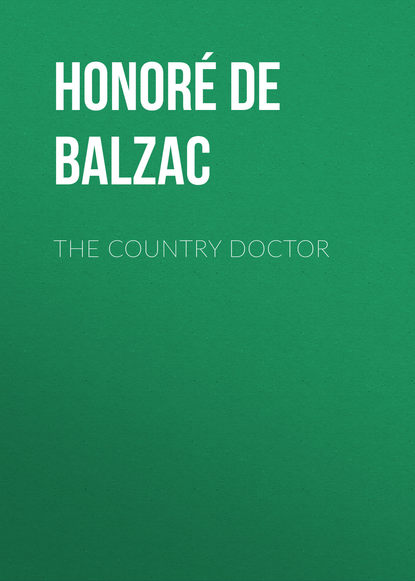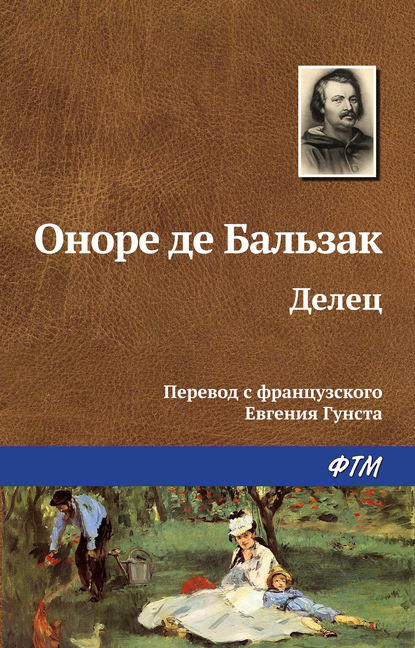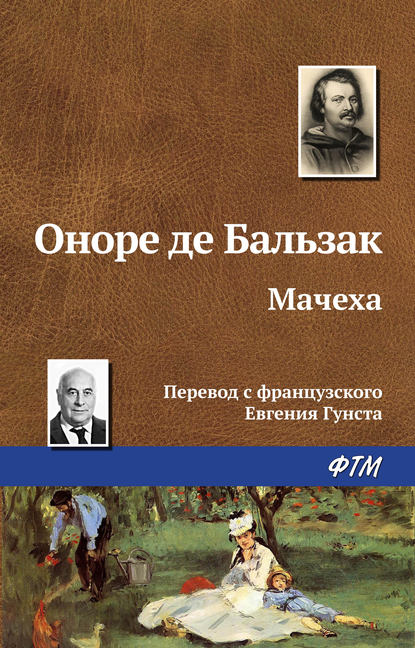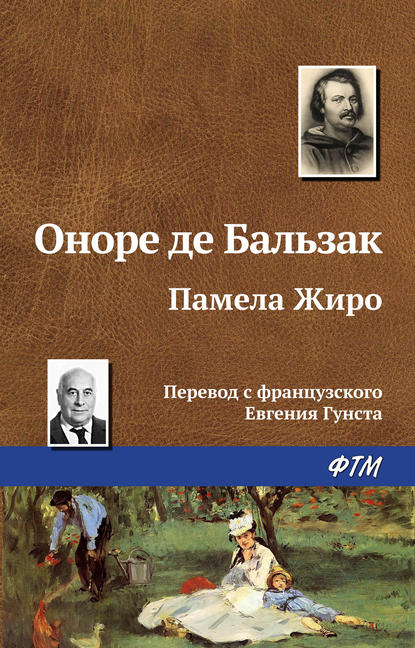
Полная версия
The Country Doctor
The four children belonging to the woman all appeared to be of the same age – an odd circumstance which struck the commandant. A fifth clung about her skirts; a weak, pale, sickly-looking child, who doubtless needed more care than the others, and who on that account was the best beloved, the Benjamin of the family.
Genestas seated himself in a corner by the fireless hearth. A sublime symbol met his eyes on the high mantel-shelf above him – a colored plaster cast of the Virgin with the Child Jesus in her arms. Bare earth made the flooring of the cottage. It had been beaten level in the first instance, but in course of time it had grown rough and uneven, so that though it was clean, its ruggedness was not unlike that of the magnified rind of an orange. A sabot filled with salt, a frying-pan, and a large kettle hung inside the chimney. The farther end of the room was completely filled by a four-post bedstead, with a scalloped valance for decoration. The walls were black; there was an opening to admit the light above the worm-eaten door; and here and there were a few stools consisting of rough blocks of beech-wood, each set upon three wooden legs; a hutch for bread, a large wooden dipper, a bucket and some earthen milk-pans, a spinning-wheel on the top of the bread-hutch, and a few wicker mats for draining cheeses. Such were the ornaments and household furniture of the wretched dwelling.
The officer, who had been absorbed in flicking his riding-whip against the floor, presently became a witness to a piece of by-play, all unsuspicious though he was that any drama was about to unfold itself. No sooner had the old woman, followed by her scald-headed Benjamin, disappeared through a door that led into her dairy, than the four children, after having stared at the soldier as long as they wished, drove away the pig by way of a beginning. This animal, their accustomed playmate, having come as far as the threshold, the little brats made such an energetic attack upon him, that he was forced to beat a hasty retreat. When the enemy had been driven without, the children besieged the latch of a door that gave way before their united efforts, and slipped out of the worn staple that held it; and finally they bolted into a kind of fruit-loft, where they very soon fell to munching the dried plums, to the amusement of the commandant, who watched this spectacle. The old woman, with the face like parchment and the dirty ragged clothing, came back at this moment, with a jug of milk for her visitor in her hand.
“Oh! you good-for-nothings!” cried she.
She ran to the children, clutched an arm of each child, bundled them into the room, and carefully closed the door of her storeroom of plenty. But she did not take their prunes away from them.
“Now, then, be good, my pets! If one did not look after them,” she went on, looking at Genestas, “they would eat up the whole lot of prunes, the madcaps!”
Then she seated herself on a three-legged stool, drew the little weakling between her knees, and began to comb and wash his head with a woman’s skill and with motherly assiduity. The four small thieves hung about. Some of them stood, others leant against the bed or the bread-hutch. They gnawed their prunes without saying a word, but they kept their sly and mischievous eyes fixed upon the stranger. In spite of grimy countenances and noses that stood in need of wiping, they all looked strong and healthy.
“Are they your children?” the soldier asked the old woman.
“Asking your pardon, sir, they are charity children. They give me three francs a month and a pound’s weight of soap for each of them.”
“But it must cost you twice as much as that to keep them, good woman?”
“That is just what M. Benassis tells me, sir; but if other folk will board the children for the same money, one has to make it do. Nobody wants the children, but for all that there is a good deal of performance to go through before they will let us have them. When the milk we give them comes to nothing, they cost us scarcely anything. Besides that, three francs is a great deal, sir; there are fifteen francs coming in, to say nothing of the five pounds’ weight of soap. In our part of the world you would simply have to wear your life out before you would make ten sous a day.”
“Then you have some land of your own?” asked the commandant.
“No, sir. I had some land once when my husband was alive; since he died I have done so badly that I had to sell it.”
“Why, how do you reach the year’s end without debts?” Genestas went on, “when you bring up children for a livelihood and wash and feed them on two sous a day?”
“Well, we never go to St. Sylvester’s Day without debt, sir,” she went on without ceasing to comb the child’s hair. “But so it is – Providence helps us out. I have a couple of cows. Then my daughter and I do some gleaning at harvest-time, and in winter we pick up firewood. Then at night we spin. Ah! we never want to see another winter like this last one, that is certain! I owe the miller seventy-five francs for flour. Luckily he is M. Benassis’ miller. M. Benassis, ah! he is a friend to poor people. He has never asked for his due from anybody, and he will not begin with us. Besides, our cow has a calf, and that will set us a bit straighter.”
The four orphans for whom the old woman’s affection represented all human guardianship had come to an end of their prunes. As their foster-mother’s attention was taken up by the officer with whom she was chatting, they seized the opportunity, and banded themselves together in a compact file, so as to make yet another assault upon the latch of the door that stood between them and the tempting heap of dried plums. They advanced to the attack, not like French soldiers, but as stealthily as Germans, impelled by frank animal greediness.
“Oh! you little rogues! Do you want to finish them up?”
The old woman rose, caught the strongest of the four, administered a gentle slap on the back, and flung him out of the house. Not a tear did he shed, but the others remained breathless with astonishment.
“They give you a lot of trouble – ”
“Oh! no, sir, but they can smell the prunes, the little dears. If I were to leave them alone here for a moment, they would stuff themselves with them.”
“You are very fond of them?”
The old woman raised her head at this, and looked at him with gentle malice in her eyes.
“Fond of them!” she said. “I have had to part with three of them already. I only have the care of them until they are six years old,” she went on with a sigh.
“But where are your own children?”
“I have lost them.”
“How old are you?” Genestas asked, to efface the impression left by his last question.
“I am thirty-eight years old, sir. It will be two years come next St. John’s Day since my husband died.”
She finished dressing the poor sickly mite, who seemed to thank her by a loving look in his faded eyes.
“What a life of toil and self-denial!” thought the cavalry officer.
Beneath a roof worthy of the stable wherein Jesus Christ was born, the hardest duties of motherhood were fulfilled cheerfully and without consciousness of merit. What hearts were these that lay so deeply buried in neglect and obscurity! What wealth, and what poverty! Soldiers, better than other men, can appreciate the element of grandeur to be found in heroism in sabots, in the Evangel clad in rags. The Book may be found elsewhere, adorned, embellished, tricked out in silk and satin and brocade, but here, of a surety, dwelt the spirit of the Book. It was impossible to doubt that Heaven had some holy purpose underlying it all, at the sight of the woman who had taken a mother’s lot upon herself, as Jesus Christ had taken the form of a man, who gleaned and suffered and ran into debt for her little waifs; a woman who defrauded herself in her reckonings, and would not own that she was ruining herself that she might be a Mother. One was constrained to admit, at the sight of her, that the good upon earth have something in common with the angels in heaven; Commandant Genestas shook his head as he looked at her.
“Is M. Benassis a clever doctor?” he asked at last.
“I do not know, sir, but he cures poor people for nothing.”
“It seems to me that this is a man and no mistake!” he went on, speaking to himself.
“Oh! yes, sir, and a good man too! There is scarcely any one hereabouts that does not put his name in their prayers, morning and night!”
“That is for you, mother,” said the soldier, as he gave her several coins, “and that is for the children,” he went on, as he added another crown. “Is M. Benassis’ house still a long way off?” he asked, when he had mounted his horse.
“Oh! no, sir, a bare league at most.”
The commandant set out, fully persuaded that two leagues remained ahead of him. Yet after all he soon caught a glimpse through the trees of the little town’s first cluster of houses, and then of all the roofs that crowded about a conical steeple, whose slates were secured to the angles of the wooden framework by sheets of tin that glittered in the sun. This sort of roof, which has a peculiar appearance, denotes the nearness of the borders of Savoy, where it is very common. The valley is wide at this particular point, and a fair number of houses pleasantly situated, either in the little plain or along the side of the mountain stream, lend human interest to the well-tilled spot, a stronghold with no apparent outlet among the mountains that surround it.
It was noon when Genestas reined in his horse beneath an avenue of elm-trees half-way up the hillside, and only a few paces from the town, to ask the group of children who stood before him for M. Benassis’ house. At first the children looked at each other, then they scrutinized the stranger with the expression that they usually wear when they set eyes upon anything for the first time; a different curiosity and a different thought in every little face. Then the boldest and the merriest of the band, a little bright-eyed urchin, with bare, muddy feet, repeated his words over again, in child fashion.
“M. Benassis’ house, sir?” adding, “I will show you the way there.”
He walked along in front of the horse, prompted quite as much by a wish to gain a kind of importance by being in the stranger’s company, as by a child’s love of being useful, or the imperative craving to be doing something, that possesses mind and body at his age. The officer followed him for the entire length of the principal street of the country town. The way was paved with cobblestones, and wound in and out among the houses, which their owners had erected along its course in the most arbitrary fashion. In one place a bake-house had been built out into the middle of the roadway; in another a gable protruded, partially obstructing the passage, and yet farther on a mountain stream flowed across it in a runnel. Genestas noticed a fair number of roofs of tarred shingle, but yet more of them were thatched; a few were tiled, and some seven or eight (belonging no doubt to the cure, the justice of the peace, and some of the wealthier townsmen) were covered with slates. There was a total absence of regard for appearances befitting a village at the end of the world, which had nothing beyond it, and no connection with any other place. The people who lived in it seemed to belong to one family that dwelt beyond the limits of the bustling world, with which the collector of taxes and a few ties of the very slenderest alone served to connect them.
When Genestas had gone a step or two farther, he saw on the mountain side a broad road that rose above the village. Clearly there must be an old town and a new town; and, indeed, when the commandant reached a spot where he could slacken the pace of his horse, he could easily see between the houses some well-built dwellings whose new roofs brightened the old-fashioned village. An avenue of trees rose above these new houses, and from among them came the confused sounds of several industries. He heard the songs peculiar to busy toilers, a murmur of many workshops, the rasping of files, and the sound of falling hammers. He saw the thin lines of smoke from the chimneys of each household, and the more copious outpourings from the forges of the van-builder, the blacksmith, and the farrier. At length, at the very end of the village towards which his guide was taking him, Genestas beheld scattered farms and well-tilled fields and plantations of trees in thorough order. It might have been a little corner of Brie, so hidden away in a great fold of the land, that at first sight its existence would not be suspected between the little town and the mountains that closed the country round.
Presently the child stopped.
“There is the door of his house,” he remarked.
The officer dismounted and passed his arm through the bridle. Then, thinking that the laborer is worthy of his hire, he drew a few sous from his waistcoat pocket, and held them out to the child, who looked astonished at this, opened his eyes very wide, and stayed on, without thanking him, to watch what the stranger would do next.
“Civilization has not made much headway hereabouts,” thought Genestas; “the religion of work is in full force, and begging has not yet come thus far.”
His guide, more from curiosity than from any interested motive, propped himself against the wall that rose to the height of a man’s elbow. Upon this wall, which enclosed the yard belonging to the house, there ran a black wooden railing on either side of the square pillars of the gates. The lower part of the gates themselves was of solid wood that had been painted gray at some period in the past; the upper part consisted of a grating of yellowish spear-shaped bars. These decorations, which had lost all their color, gradually rose on either half of the gates till they reached the centre where they met; their spikes forming, when both leaves were shut, an outline similar to that of a pine-cone. The worm-eaten gates themselves, with their patches of velvet lichen, were almost destroyed by the alternate action of sun and rain. A few aloe plants and some chance-sown pellitory grew on the tops of the square pillars of the gates, which all but concealed the stems of a couple of thornless acacias that raised their tufted spikes, like a pair of green powder-puffs, in the yard.
The condition of the gateway revealed a certain carelessness of its owner which did not seem to suit the officer’s turn of mind. He knitted his brows like a man who is obliged to relinquish some illusion. We usually judge others by our own standard; and although we indulgently forgive our own shortcomings in them, we condemn them harshly for the lack of our special virtues. If the commandant had expected M. Benassis to be a methodical or practical man, there were unmistakable indications of absolute indifference as to his material concerns in the state of the gates of his house. A soldier possessed by Genestas’ passion for domestic economy could not help at once drawing inferences as to the life and character of its owner from the gateway before him; and this, in spite of his habits of circumspection, he in nowise failed to do. The gates were left ajar, moreover – another piece of carelessness!
Encouraged by this countrified trust in all comers, the officer entered the yard without ceremony, and tethered his horse to the bars of the gate. While he was knotting the bridle, a neighing sound from the stable caused both horse and rider to turn their eyes involuntarily in that direction. The door opened, and an old servant put out his head. He wore a red woolen bonnet, exactly like the Phrygian cap in which Liberty is tricked out, a piece of head-gear in common use in this country.
As there was room for several horses, this worthy individual, after inquiring whether Genestas had come to see M. Benassis, offered the hospitality of the stable to the newly-arrived steed, a very fine animal, at which he looked with an expression of admiring affection. The commandant followed his horse to see how things were to go with it. The stable was clean, there was plenty of litter, and there was the same peculiar air of sleek content about M. Benassis’ pair of horses that distinguished the cure’s horse from all the rest of his tribe. A maid-servant from within the house came out upon the flight of steps and waited. She appeared to be the proper authority to whom the stranger’s inquiries were to be addressed, although the stableman had already told him that M. Benassis was not at home.
“The master has gone to the flour-mill,” said he. “If you like to overtake him, you have only to go along the path that leads to the meadow; and the mill is at the end of it.”
Genestas preferred seeing the country to waiting about indefinitely for Benassis’ return, so he set out along the way that led to the flour-mill. When he had gone beyond the irregular line traced by the town upon the hillside, he came in sight of the mill and the valley, and of one of the loveliest landscapes that he had ever seen.
The mountains bar the course of the river, which forms a little lake at their feet, and raise their crests above it, tier on tier. Their many valleys are revealed by the changing hues of the light, or by the more or less clear outlines of the mountain ridges fledged with their dark forests of pines. The mill had not long been built. It stood just where the mountain stream fell into the little lake. There was all the charm about it peculiar to a lonely house surrounded by water and hidden away behind the heads of a few trees that love to grow by the water-side. On the farther bank of the river, at the foot of a mountain, with a faint red glow of sunset upon its highest crest, Genestas caught a glimpse of a dozen deserted cottages. All the windows and doors had been taken away, and sufficiently large holes were conspicuous in the dilapidated roofs, but the surrounding land was laid out in fields that were highly cultivated, and the old garden spaces had been turned into meadows, watered by a system of irrigation as artfully contrived as that in use in Limousin. Unconsciously the commandant paused to look at the ruins of the village before him.
How is it that men can never behold any ruins, even of the humblest kind, without feeling deeply stirred? Doubtless it is because they seem to be a typical representation of evil fortune whose weight is felt so differently by different natures. The thought of death is called up by a churchyard, but a deserted village puts us in mind of the sorrows of life; death is but one misfortune always foreseen, but the sorrows of life are infinite. Does not the thought of the infinite underlie all great melancholy?
The officer reached the stony path by the mill-pond before he could hit upon an explanation of this deserted village. The miller’s lad was sitting on some sacks of corn near the door of the house. Genestas asked for M. Benassis.
“M. Benassis went over there,” said the miller, pointing out one of the ruined cottages.
“Has the village been burned down?” asked the commandant.
“No, sir.”
“Then how did it come to be in this state?” inquired Genestas.
“Ah! how?” the miller answered, as he shrugged his shoulders and went indoors; “M. Benassis will tell you that.”
The officer went over a rough sort of bridge built up of boulders taken from the torrent bed, and soon reached the house that had been pointed out to him. The thatched roof of the dwelling was still entire; it was covered with moss indeed, but there were no holes in it, and the door and its fastenings seemed to be in good repair. Genestas saw a fire on the hearth as he entered, an old woman kneeling in the chimney-corner before a sick man seated in a chair, and another man, who was standing with his face turned toward the fireplace. The house consisted of a single room, which was lighted by a wretched window covered with linen cloth. The floor was of beaten earth; the chair, a table, and a truckle-bed comprised the whole of the furniture. The commandant had never seen anything so poor and bare, not even in Russia, where the moujik’s huts are like the dens of wild beasts. Nothing within it spoke of ordinary life; there were not even the simplest appliances for cooking food of the commonest description. It might have been a dog-kennel without a drinking-pan. But for the truckle-bed, a smock-frock hanging from a nail, and some sabots filled with straw, which composed the invalid’s entire wardrobe, this cottage would have looked as empty as the others. The aged peasant woman upon her knees was devoting all her attention to keeping the sufferer’s feet in a tub filled with a brown liquid. Hearing a footstep and the clank of spurs, which sounded strangely in ears accustomed to the plodding pace of country folk, the man turned to Genestas. A sort of surprise, in which the old woman shared was visible in his face.
“There is no need to ask if you are M. Benassis,” said the soldier. “You will pardon me, sir, if, as a stranger impatient to see you, I have come to seek you on your field of battle, instead of awaiting you at your house. Pray do not disturb yourself; go on with what you are doing. When it is over, I will tell you the purpose of my visit.”
Genestas half seated himself upon the edge of the table, and remained silent. The firelight shone more brightly in the room than the faint rays of the sun, for the mountain crests intercepted them, so that they seldom reached this corner of the valley. A few branches of resinous pinewood made a bright blaze, and it was by the light of this fire that the soldier saw the face of the man towards whom he was drawn by a secret motive, by a wish to seek him out, to study and to know him thoroughly well. M. Benassis, the local doctor, heard Genestas with indifference, and with folded arms he returned his bow, and went back to his patient, quite unaware that he was being subjected to a scrutiny as earnest as that which the soldier turned upon him.
Benassis was a man of ordinary height, broad-shouldered and deep-chested. A capacious green overcoat, buttoned up to the chin, prevented the officer from observing any characteristic details of his personal appearance; but his dark and motionless figure served as a strong relief to his face, which caught the bright light of the blazing fire. The face was not unlike that of a satyr; there was the same slightly protruding forehead, full, in this case, of prominences, all more or less denoting character; the same turned-up nose, with a sprightly cleavage at the tip; the same high cheek-bones. The lines of the mouth were crooked; the lips, thick and red. The chin turned sharply upwards. There was an alert, animated look in the brown eyes, to which their pearly whites gave great brightness, and which expressed passions now subdued. His iron-gray hair, the deep wrinkles in his face, the bushy eyebrows that had grown white already, the veins on his protuberant nose, the tanned face covered with red blotches, everything about him, in short, indicated a man of fifty and the hard work of his profession. The officer could come to no conclusion as to the capacity of the head, which was covered by a close cap; but hidden though it was, it seemed to him to be one of the square-shaped kind that gave rise to the expression “square-headed.” Genestas was accustomed to read the indications that mark the features of men destined to do great things, since he had been brought into close relations with the energetic natures sought out by Napoleon; so he suspected that there must be some mystery in this life of obscurity, and said to himself as he looked at the remarkable face before him:
“How comes it that he is still a country doctor?”
When he had made a careful study of this countenance, that, in spite of its resemblance to other human faces, revealed an inner life nowise in harmony with a commonplace exterior, he could not help sharing the doctor’s interest in his patient; and the sight of that patient completely changed the current of his thoughts.
Much as the old cavalry officer had seen in the course of his soldier’s career, he felt a thrill of surprise and horror at the sight of a human face which could never have been lighted up with thought – a livid face in which a look of dumb suffering showed so plainly – the same look that is sometimes worn by a child too young to speak, and too weak to cry any longer; in short, it was the wholly animal face of an old dying cretin. The cretin was the one variety of the human species with which the commandant had not yet come in contact. At the sight of the deep, circular folds of skin on the forehead, the sodden, fish-like eyes, and the head, with its short, coarse, scantily-growing hair – a head utterly divested of all the faculties of the senses – who would not have experienced, as Genestas did, an instinctive feeling of repulsion for a being that had neither the physical beauty of an animal nor the mental endowments of man, who was possessed of neither instinct nor reason, and who had never heard nor spoken any kind of articulate speech? It seemed difficult to expend any regrets over the poor wretch now visibly drawing towards the very end of an existence which had not been life in any sense of the word; yet the old woman watched him with touching anxiety, and was rubbing his legs where the hot water did not reach them with as much tenderness as if he had been her husband. Benassis himself, after a close scrutiny of the dull eyes and corpse-like face, gently took the cretin’s hand and felt his pulse.












